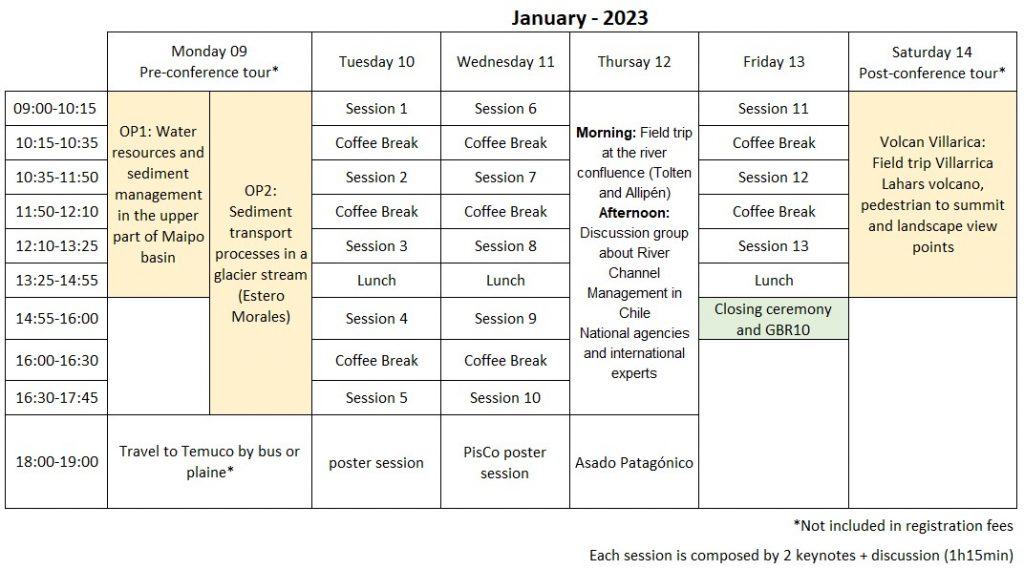Download the final program here
SESSION TOPICS, KEYNOTE SPEAKERS AND TITLES
Session 1. Gravel-bed rivers at the scale of grains (session moderated by Chapuis M.)
- The contribution of grain sorting to the dynamics of the bedload active layer: Alain Recking (French National Institute for Agriculture, Food, and Environment, France)
- Automated measurement of bed structure: the role of sediment sorting on particle mobility: Elowyn Yager (Department of Civil and Environmental Engineering, University of Idaho, USA)
Session 2. Sediment transport processes (session moderated by Curran J.)
- Physical Scale Modelling of Sediment Transport Processes in Gravel Bed Rivers: Oscar Link (Departamento de Ingeniería Civil, Universidad de Concepción, Chile)
- Bedload tracing with RFID tags in gravel-bed rivers: 20 years of field and laboratory experiments: Frederic Liebault (ISTEA, Grenoble, France)
Session 3. Advances in numerical modelling (session moderated by Escauriaza C.)
- Chaotic interactions between riverbed evolution and vegetation dynamics prevent long-term predictions of fluvial morphology: Nunzio Siviglia (Department of Civil, Environmental and Mechanical Engineering, Università degli Studi di Trento, Italy)
- Uncertainty quantification of bank vegetation impacts on the flood flow field in the American River, California: Insights gained via large-eddy simulation: Kevin Flora (Department of Civil Engineering, Stony Brook University, USA)
Session 4. Gravel-bed rivers and global environmental changes (session moderated by Bertoldi W.)
- Exploring the implications of equilibrium channel geometry for long-term landscape evolution: Greg Tucker (Department of Geological Sciences, CIRES, University of Colorado at Boulder, USA)
- Metal mining impacts on river systems: Mark Macklin (Centre for Water and Planetary Health, University of Lincoln, UK)
Session 5. Gravel-bed rivers affected by extreme disturbances (session moderated by Bathurst J.)
- Gravel bed river response to volcanic sediment loading: Andrew Russell (School of Geography, Politics and Sociology, Newcastle University, UK)
- Geomorphic signatures of glacier lake outburts floods in Patagonia: Pablo Iribarren (Instituto de Ciencias de la Tierra, Universidad Austral de Chile) and Thomas Loriaux (Universidad de Santiago de Chile, Chile)
Session 6. Vegetation and large wood in gravel-bed rivers (session moderated by Wilcox A.)
- Feedbacks among vegetation, channel morphology, and bankfull discharge recurrence intervals: Joel Johnson (Jackson School of Geosciences, The University of Texas at Austin, USA)
- Is it all just about sediment in gravel-bed rivers? Current progress in research on instream large wood: Virginia Ruiz-Villanueva (University of Lausanne, Switzerland)
Session 7. Not only gravel in gravel-bed rivers (session moderated by Caamaño D.)
- Source or Sink? Exploring the role gravel bed rivers play in modulating the flux of microplastics in the environment: Annie Ockelford (Environment Agency, UK)
- The Power of Biology in River Environments: Matthew Johnson (School of Geography, University of Nottingham, UK)
Session 8. Integrated assessment of gravel-bed rivers (session moderated by Iroumé A.)
- Integrated assessment of riverscapes from local to global scale: Barbara Belletti (CNRS-EVS Environnement Ville Société | ENS de Lyon, France)
- Historical changes on long-impacted European rivers: Vittoria Scorpio (Dipartimento di Scienze Chimiche e Geologiche, Universitá di Modena e Reggio Emilia, Italy)
Session 9. River management and restoration (session moderated by Tranmer A.)
- The management of gravel-bed rivers in urban environments: a case study of the Toronto area in Canada: Bruce MacVicar (University of Waterloo, Canada)
- River restoration in post-continental glaciated landscapes – experiences and challenges: Lina Polvi, (Umeå Universitet, Sweden)
Session 10. People and gravel-bed rivers (session moderated by Dussaillant A.)
- Catchment – scale monitoring of river change to support a gravel management plan, Waiapu River, Aotearoa New Zealand. Jon Tunniclife (School of Environment, Auckland University, NZ)
- Biocultural approaches to revalue waterscapes: (dis) encounters in Wallmapu-Patagonia. Juana Aigo (Instituto de Diversidad y Evolución Austral, CONICET, Puerto Madryn, Argentina) and Camila Bañales (Universidad de Concepción, Chile)
Session 11. Gravel-bed rivers beyond their watersheds (session moderated by Mao L.)
- Bar-built estuarine dynamics and watershed-coastal interactions: Megan Williams (Facultad de Ingeniería Civil, Universidad Federico Santa Maria, Chile)
- Decline of sediment supply and delta regression in the Medirranean due to human interventions. Effects of river engineering works: Carles Ferrer Boix (Universitat Politècnica de Catalunya, Barcelona)
Session 12. New tools for advanced studies of gravel-bed rivers (session moderated by Camenen B.)
- The use of innovative technology for fluvial monitoring: Alonso Pizarro (Department of Civil Engineering, Diego Portales University, Chile)
- The potential of new methods for improving predictions of critical shear stress in gravel bed rivers: Rebecca Hodge (Department of Geography, Durham University, UK)
Session 13. Advances in monitoring of gravel-bed rivers (session moderated by Rickenmann D.)
- Transport of solutes and more complex substances in streams and rivers: Diogo Bolster (Civil & Environmental Engineering and Earth Sciences. University of Notre Dame, US)
- Monitoring bedload transport in glacier-fed streams by seismic techniques: Velio Coviello (Research institute for geo-hydrological protection, CNR, Italy)
THE CONFERENCE PROGRAM
Discussion group about River Channel Management in Chile:
1. Gravel Mining and River Restoration
2. Flood Management
3. Sediment Management in Reservoir (Flushing and Sedimentation)
4. Aquatic Habitats in Gravel Bed Rivers
Social dinner and caffee sessions



